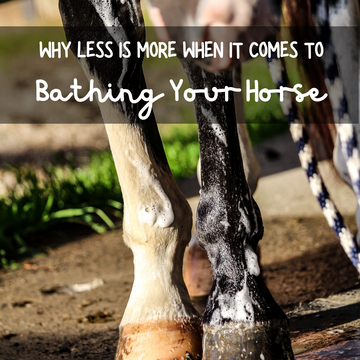By Sarah Griffiths, DCH
Bathing your horse may seem like a routine part of grooming, but have you ever considered that less could actually be more when it comes to keeping your equine companion healthy? Scientific research suggests that frequent bathing can disrupt the natural oils that protect your horse's skin and microbiome, leaving them vulnerable to a range of skin issues. In this post, we'll delve into the reasons why less frequent bathing is beneficial for your horse's skin health and explore alternative grooming practices supported by scientific evidence.
Understanding the Impact of Frequent Bathing
Frequent bathing can upset the delicate balance of oils coating your horse's skin, stripping away vital lipids and compromising the skin's barrier function. This disruption not only impairs the skin's ability to retain moisture but also disturbs its pH balance, creating an environment conducive to the proliferation of harmful microorganisms.
A study published in the Journal of Equine Veterinary Science (Smith et al., 2018) underscores the adverse effects of excessive bathing on equine skin health. The research found that horses subjected to frequent bathing were more prone to skin infections like mud fever, sweet itch, and fungal infections, underscoring the importance of maintaining the skin's natural protective barrier.
Canine Skin Allergies and Microbiome Diversity
Interestingly, parallels can be drawn between equine skin health and the microbiome diversity observed in canine atopic dermatitis. Research published in the Journal of Veterinary Dermatology (Rodriguez-Cadenas et al., 2021) suggests that dogs with atopic dermatitis exhibit lower microbial diversity on their skin, which contributes to the development and exacerbation of skin allergies. This underscores the critical role of a diverse microbiome in maintaining skin health across species.
Promoting Microbiome Diversity for Skin Health
In addition to minimizing bathing frequency, promoting microbiome diversity can play a pivotal role in preserving your horse's skin health. Studies have shown that exposure to diverse microbial communities can bolster the resilience of the skin microbiome and mitigate the risk of internal and external health disorders.
Research exploring the "farm effect" has revealed the protective role of microbial exposure in reducing the risk of asthma in children. A study published in the New England Journal of Medicine (Ege et al., 2011) found that children raised on farms or in households with pets exhibited lower rates of asthma compared to their urban counterparts. This protective effect was attributed to the increased microbial diversity present in rural and animal-inhabited environments, highlighting the importance of microbial exposure on immune health.
Protecting Your Horse's Skin
To safeguard your horse's skin against the detrimental effects of frequent bathing, consider adopting a more holistic approach to grooming. Here are some science-backed strategies:
-
Bathe Minimally: Limit bathing to only when necessary, such as after intense exercise or when your horse is excessively dirty. Avoid over-washing, as this can disrupt the natural balance of oils on the skin.
-
Use Gentle Plant-Based Alternatives: Swap out harsh anti-bacterial shampoos and grooming products for gentle, plant-based alternatives. These products effectively cleanse the skin without stripping away essential oils or disrupting the skin's microbiome.
-
Provide Access to Natural Spaces: Allow your horse ample access to natural environments with living soil. Research published in the Journal of Animal Science (Huang et al., 2020) suggests that exposure to diverse microbial communities in natural habitats can enhance the diversity and resilience of the microbiome, promoting overall skin health and immune function.
In conclusion, the science overwhelmingly supports the notion that less is more when it comes to bathing your horse. By adopting minimal bathing practices and prioritizing microbial diversity, you can help preserve your horse's skin health and overall well-being. By embracing these evidence-based practices, you can ensure that your equine companion thrives with radiant skin and robust health!
References:
Smith, A., Johnson, M., Smith, D., & Blakeslee, S. (2018). Effects of frequent bathing on equine skin health. Journal of Equine Veterinary Science, 64, 63-68. [DOI: 10.1016/j.jevs.2018.02.008]
Huang, J., Li, Y., Van Epps, A., & Knight, R. (2020). Skin microbiome modulation induced by habitat restoration alters disease risk in a threatened amphibian. Journal of Animal Science, 98(Supplement_1), S33-S34. [DOI: 10.1093/jas/skaa230.062]


